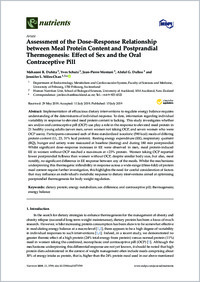Assessment of the dose–response relationship between meal protein content and postprandial thermogenesis: effect of sex and the oral contraceptive pill
- Duhita, Maharani R. Department of Endocrinology, Metabolism and Cardiovascular System, Faculty of Sciences and Medicine, University of Fribourg, Switzerland
- Schutz, Yves Department of Endocrinology, Metabolism and Cardiovascular System, Faculty of Sciences and Medicine, University of Fribourg, Switzerland
- Montani, Jean-Pierre Department of Endocrinology, Metabolism and Cardiovascular System, Faculty of Sciences and Medicine, University of Fribourg, Switzerland
- Dulloo, Abdul G. Department of Endocrinology, Metabolism and Cardiovascular System, Faculty of Sciences and Medicine, University of Fribourg, Switzerland
- Miles-Chan, Jennifer L. Department of Endocrinology, Metabolism and Cardiovascular System, Faculty of Sciences and Medicine, University of Fribourg, Switzerland - Human Nutrition Unit, School of Biological Sciences, University of Auckland, New Zealand
-
01.07.2019
Published in:
- Nutrients. - 2019, vol. 11, no. 7, p. 1599
English
Implementation of efficacious dietary interventions to regulate energy balance requires understanding of the determinants of individual response. To date, information regarding individual variability in response to elevated meal protein content is lacking. This study investigates whether sex and/or oral contraceptive pill (OCP) use play a role in the response to elevated meal protein in 21 healthy young adults (seven men, seven women not taking OCP, and seven women who were OCP users). Participants consumed each of three standardized isocaloric (590 kcal) meals of differing protein content (11, 23, 31% kcal protein). Resting energy expenditure (EE), respiratory quotient (RQ), hunger and satiety were measured at baseline (fasting) and during 180 min postprandial. Whilst significant dose–response increases in EE were observed in men, meal protein-induced EE in women without OCP reached a maximum at <23% protein. Women taking OCP reported lower postprandial fullness than women without OCP, despite similar body size, but also, most notably, no significant difference in EE response between any of the meals. Whilst the mechanisms underpinning this thermogenic inflexibility in response across a wide-range (three-fold) of protein meal content require further investigation, this highlights the need for careful consideration of factors that may influence an individual’s metabolic response to dietary interventions aimed at optimising postprandial thermogenesis for body weight regulation.
- Faculty
- Faculté des sciences et de médecine
- Department
- Département de Médecine
- Language
-
- English
- Classification
- Biological sciences
- License
-
License undefined
- Identifiers
-
- RERO DOC 327405
- DOI 10.3390/nu11071599
- Persistent URL
- https://folia.unifr.ch/unifr/documents/308069
Statistics
Document views: 166
File downloads:
- pdf: 114
